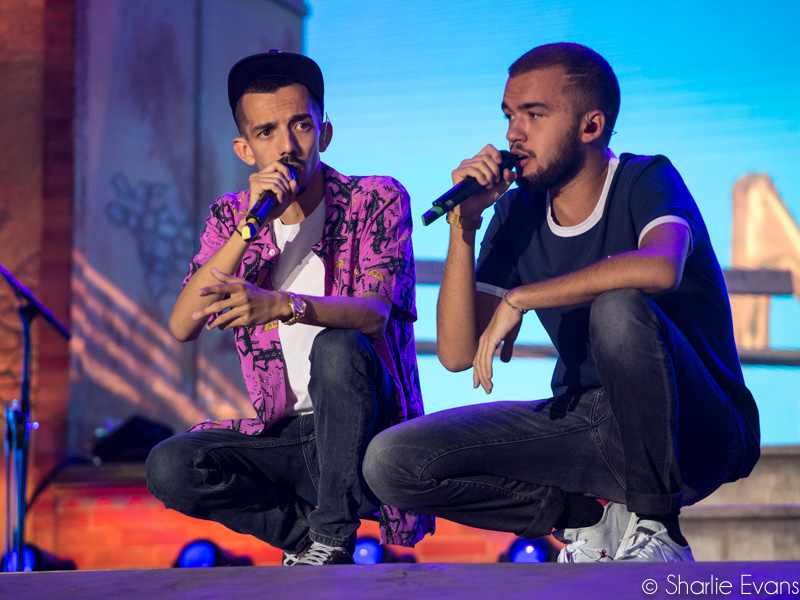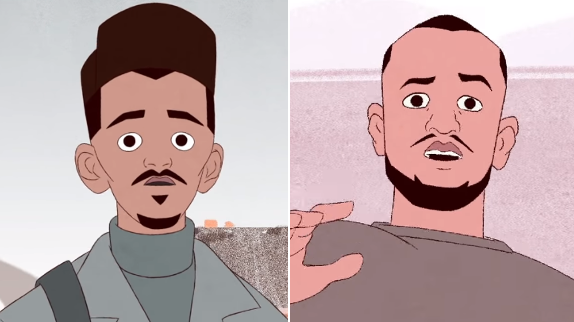Bigflo and Oli are two French rappers, who regularly write pieces devoted to political ideas, especially on immigration. Being children of Argentinian immigrants themselves, they are very involved in raising awareness about this topic and in building empathy and deepening understanding beyond traditional debates.

Something that has been highlights since Russia’s invasion of Ukraine in February 2022 is that sympathy and empathy for refugees can be limited and conditional. In the UK for example, political policies and refugee resettlement schemes have been accelerated for victims of conflict who have been displaced from Ukraine; but at the same time, government rhetoric and public opinion have been increasingly hostile towards refugees from other conflict zones in Africa and the Middle East. Commentators are describing the UK’s immigration policy as ‘segregated’ and ‘unashamedly racist‘.
Many studies have shown that race and ethnicity play a key role in determining feelings like empathy amongst local populations in relation to immigrants. One study, for example, has shown that – thanks in part to their long experiences of injustice and oppression – African Americans and Latinos in the US are ‘significantly more likely to side with minority detainees and support pro–civil rights policies and actions’ than other groups.[i]. This indicates that suffering happening ‘closer’ to us impacts us more than suffering we see in people we do not identify so closely with. This is not just a matter of geography but also connected to social, cultural and historical mindsets; and, of course, it is also due to the way in which certain forms of suffering – and certain groups – are presented by influential forms of storytelling, such as news media or political debate.
Rappers Bigflo et Oli understand this. They have hypothesised that forced migration is often pictured as something that can never happen to white people, as something that goes on elsewhere; and they recognise that these assumptions are constantly reinforced by narratives which build in yet more distance between displaced and non-displaced people.
They decided to try and turn this around. What if, quite literally, they pictured elsewhere as being right here, where they are. Swapping countries usually blamed for their emigration flows, they picture France with French symbols such as the Eiffel Tower to speak to the minds of their listeners, to suggest another reality and provoke empathy.
Here is a translation of the French Version of their song ‘Rentrez Chez Vous!’:
That’s it, they’ve blown up the Eiffel Tower

We didn’t think that they would dare, but now the deed is done
How did we get here? It’s hard to believe
The night was calm, they only bombed it three times
I drove up to Paris to see my girlfriend
The war got us by surprise, dragged us out of our routine
Replacing flowers by cries, and whispers by shouts
Her building was hit, I didn’t find her under the wrecked ruins
I’m gonna go home empty-handed to join my family in the first train
The departure is tomorrow morning
Man is capable of wonders and of the worse insanities
It’s already been four days, I have no news from Oli.
Fuck, the war is here
They’ve broken all ivory towers
I had only known it from history books
I look after my family, truth is my parents are getting old
We pack up buses, cut off roads
We protect ourselves with what we can
And the crowd follows those crazy people, no straightjacket
They say people are getting killed, Capitol square
Four tickets for the ferry
One chance to get away
A new life on the other coast of the Mediterranean
Gunshots mock us, we’re scared to be in the wrong place, at the wrong time
My brother told me: if I don’t come back leave without me
It’s hard to know what’s happening, they’ve cut the grid
It’s been almost 4 days and I have no news from Flo.
The artists here make use of common methods to generate empathy in people, by specifically engaging a French audience with mentions of well-known places and cultural reference-points. They are careful to use different cities and a famous harbour so that anyone can picture and imagine themselves in the situation right away. Using French geographies and traditional technologies (e.g.: the train) they push us to imagine the endless steps and hardships of migrants, transposing their experience into a more relatable one.
Finally, towards the end of the piece, they transpose a radio discourse. They take their inspiration from mainstream media and the usual discourse of “I am not racist, but” which can be heard frequently on the air or social networks. This flips the story, so that audiences – imaging themselves momentarily as victims – encounter the kind of rhetoric which privileged people often use to explain why they cannot help, why they do not want to welcome forced migrants to their local area. In the process, refugee experiences are rendered relatable – we are invited to empthaise as with a neighbour or a friend – and audiences are encouraged to be self-aware about their own attitudes and behaviours. What if things had been reversed, what if things were different? What if our local town, our prosperity, wealth and culture, had been blown up, reduced to piles of ashes and ruins? What if there was nowhere safe to go in the UK, in France, the United States, Germany… what would happen then?
This rap tackles a recurring consequence of conflict; and it is peace-building because it deepens understanding and promotes empathy. It uses the power of a particular kind of vivid, relatable storytelling – and the reach of popular culture – to tackle othering and conceptual, emotional distance and to bring refugee experiences closer to home.
What do you think?
- Do you think that this rap enables you to feel the experience of forced migrants better?
- How does it compare with representations you have come across in the media?
- Might it encourage you not only to feel but also to behave differently in future, having imagined yourself into the situation that many refugees face?
- Does the placement of the rap in a city like Paris make a difference to your understanding and empathy?
- What role can popular culture play in building more peace in the world?
If you enjoyed this item in our museum…
You might also like ‘The Wolfe Tones‘, ‘Pockets of Peace‘, ‘Make me a channel for your peace‘, ‘Iraqi women at war‘ and ‘Jasmine‘.
Margaux de Seze, December 2023
[i] Sirin, C.V., Valentino, N.A. and Villalobos, J.D. (2016) “Group empathy theory: The effect of group empathy on US intergroup attitudes and behavior in the context of immigration threats,” The Journal of Politics, 78(3), pp. 893–908. Available at: https://doi.org/10.1086/685735.